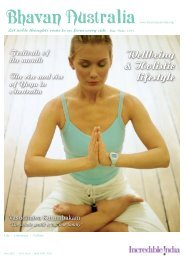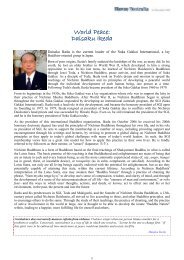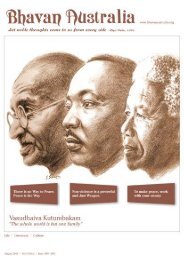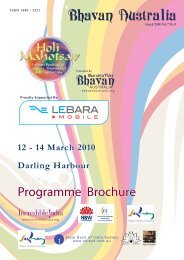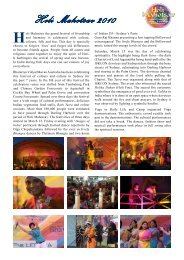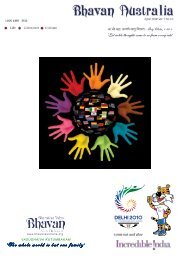The whole world is but one family - Bharatiya Vidya Bhavan Australia
The whole world is but one family - Bharatiya Vidya Bhavan Australia
The whole world is but one family - Bharatiya Vidya Bhavan Australia
Create successful ePaper yourself
Turn your PDF publications into a flip-book with our unique Google optimized e-Paper software.
For th<strong>is</strong> Month<br />
Saving Water—<strong>The</strong> Gandhian Way<br />
Mahatma Gandhi first realized the virtue of truth and ahimsa at a very early<br />
age, probably even earlier than the beginning of h<strong>is</strong> teen years and, perhaps,<br />
h<strong>is</strong> firm faith in truth was establ<strong>is</strong>hed then. When Gandhi was 15 (1884), he<br />
had removed a bit of gold from h<strong>is</strong> brother’s armlet to clear a small debt of h<strong>is</strong><br />
brother. He felt so mortified about h<strong>is</strong> act that he decided to make a confession<br />
to h<strong>is</strong> father. He wrote it on a slip of paper and personally handed it to h<strong>is</strong><br />
father. Gandhi recalled in h<strong>is</strong> autobiography: “In th<strong>is</strong> note not only did I confess<br />
my guilt, <strong>but</strong> I asked adequate pun<strong>is</strong>hment for it, and closed with a request to<br />
him not to pun<strong>is</strong>h himself for my offence. I also pledged myself never to steal<br />
in future.” One of the sentences in the confession was: “So, father, your son <strong>is</strong><br />
now, in your eyes, no better than a common thief.” <strong>The</strong> incident left a lasting<br />
mark on h<strong>is</strong> mind. In h<strong>is</strong> own words, ‘it was an object-lesson to him in the<br />
power of ahimsa.’<br />
Mahatma Gandhi was given a send-off by h<strong>is</strong> fellow students of the Alfred<br />
High School, Rajkot on 4 July 1888 (in the nineteenth year of h<strong>is</strong> age), when<br />
he was leaving for England to study for the Bar. In An Autobiography (Pt I.Ch<br />
XI) he says: “I had written out a few words of thanks. But I could scarcely<br />
stammer them out. I remember how my head reeled and my <strong>whole</strong> frame<br />
shook as I stood up to read them.” H<strong>is</strong> speech reads thus: “I hope that some<br />
of you will follow in my footsteps, and after you return from England you will<br />
work <strong>whole</strong>heartedly for big reforms in India.” (Th<strong>is</strong> <strong>is</strong> the Engl<strong>is</strong>h translation,<br />
publ<strong>is</strong>hed in the Kathiawar Times, of h<strong>is</strong> speech in Gujarati). We can sense<br />
here the budding leadership quality of perhaps the <strong>world</strong>’s greatest leader<br />
of all times.<br />
Mahatma Gandhi had very limited funds to survive h<strong>is</strong> studies in London and<br />
on the top of that he had vowed to remain vegetarian. One of h<strong>is</strong> prom<strong>is</strong>es<br />
given to h<strong>is</strong> mother to obtain her perm<strong>is</strong>sion to go to London was to remain<br />
vegetarian. He had adhered, in the teeth of opposition, to h<strong>is</strong> vows. It was quite<br />
hard in those days to remain vegetarian; the vegetarian restaurants were scarce<br />
and sparsely spread. Th<strong>is</strong>, 19 years old, Mohandas Gandhi in the process of<br />
locating vegetarian restaurants around the place of h<strong>is</strong> residence was put in<br />
contact with the London Vegetarian Society. He was taken on the executive<br />
committee of the Society and was called on to give a talk on, of all subjects,<br />
“<strong>The</strong> Foods of India” which was publ<strong>is</strong>hed in <strong>The</strong> Vegetarian Message. Soon he<br />
started contri<strong>but</strong>ing regularly on the Indian Vegetarian system, Indian foods,<br />
and Indian festivals…for their weekly magazine <strong>The</strong> Vegetarian. Mohandas’s<br />
Engl<strong>is</strong>h vegetarian friends, all of them belonging to Britain’s respectable<br />
classes gave him company, a chance to serve a cause (vegetarian<strong>is</strong>m), training<br />
in selling a cause (he helped organize meetings and cooked and d<strong>is</strong>played<br />
sample vegetarian meals) and in writing and friends. Mohandas was drawn to<br />
these men and women; their character and courage evoked h<strong>is</strong> respect, and<br />
they seemed to enjoy a standing in Brit<strong>is</strong>h society. <strong>The</strong> coincidence between<br />
their views and h<strong>is</strong> mother’s was not a small d<strong>is</strong>covery for Mohandas. It gave<br />
a vital legitimacy to h<strong>is</strong> Indian inner voice. In the autobiography he writes that<br />
h<strong>is</strong> London experiences harmonized h<strong>is</strong> inward and outward life and that h<strong>is</strong><br />
soul knew no bounds of joy. <strong>The</strong>se words also apply to the concord he felt in<br />
London between the universal and the Indian, between pure truth and h<strong>is</strong> vows.<br />
Th<strong>is</strong> brief account of Mahatma Gandhi’s early days entitles us to consider that<br />
by the time he fin<strong>is</strong>hed h<strong>is</strong> studies in London he had already developed h<strong>is</strong><br />
thoughts, ethical values and essential character on which he built h<strong>is</strong> later life<br />
and the early words of Mohandas Gandhi may be taken as seriously as those of<br />
Mahatma Gandhi of later time.<br />
4 | <strong>Bhavan</strong> <strong>Australia</strong> | February 2012



